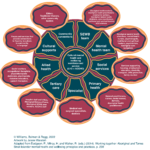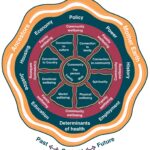
August 2024
Download Common issues Aboriginal and Torres Strait Islander organisations face working with governments PDF
A host of recurrent issues face Aboriginal and Torres Strait Islander organisations working with governments. The main issues are shown in Figure 1.
Figure 1: Issues commonly faced

These issues recur in our direct experience working with governments, and in our experience working with other Aboriginal and Torres Strait Islander organisations who work with government, and reflect the Aboriginal and Torres Strait Islander-authored literature. While they do not exist in all relationships with government, where they do exist, they have a significant impact.
Timeframe
Do timeframes allow for consultation in accordance with cultural protocols?
Aboriginal and Torres Strait Islander cultures are collective rather than individualistic, and usually decisions are not made by a single person. Decisions arise from consultation with community, or with boards that represent community through ACCOs and ACCHOs.
Government timeframes, bound as they are by financial years, too often conflict with the time required to consult and make decisions properly.
Are any delays in starting the project or program reflected in the available time to complete the work?
In our project work, we often receive contracts that are dated several months back, when the project was due to start. But it is unusual to have the end time of a project extended – it is common for the Aboriginal and Torres Strait Islander organisation to need to make up for the time lost in the procurement process.
People in the room
Are the subject matter experts in the room?
We have heard frequently that the people Aboriginal and Torres Strait Islander organisations are meeting with regularly work on the contractual or administrative side of their department, and do not have subject matter expertise. That causes difficulties.
Can the people in the room make a decision?
Government departments and agencies are hierarchical, and often decisions can only be made by staff at a certain level. If those in the room can’t make a decision, it can lead to inflexibility and contract management, rather than the pursuit of a common goal.
KPIs
Do KPIs reflect the work?
KPIs in government contracts, like timeframes, are often driven by the reporting requirements that Treasury places on departments and agencies.
Work that is carried out by Aboriginal and Torres Strait Islander organisations may or may not match expectations of Treasury, which means that KPIs can be frequently misaligned with the work being done.
Are KPIs meaningful to Aboriginal and Torres Strait Islander people?
Again, KPIs developed by Treasury largely reflect the dominant culture. They may or may not be meaningful to Aboriginal and Torres Strait Islander people.
Cultural knowledge
Do government staff have the cultural knowledge required?
It is our experience, and the experience of many others, that the cultural knowledge required to work effectively with Aboriginal and Torres Strait Islander people and organisations can not be assumed. While there are plenty who have the cultural knowledge required to work in partnership with Aboriginal and Torres Strait Islander organisations, there are plenty of others who don’t. That causes problems if those with inadequate cultural knowledge aren’t aware of those gaps, or their importance, especially if they are in decision-making roles.
This can lead to a cultural load, as Aboriginal and Torres Strait Islander organisations are often expected to be educators due to gaps in anti-racism and cultural safety training.
Gatekeepers
Do government staff support easy access to other government staff?
Governments are big, and units are specialised. Sometimes you want to talk to people in other areas to learn more. Sometimes you need to have a discussion to know what questions to ask. Sometimes, a conversation will save 10 emails and two weeks. Sometimes, the government staff in the room support the flow of information., And sometimes they are gatekeepers.
So what?
These issues all affect the ways in which Aboriginal and Torres Strait Islander organisations work with government. Bringing them to light may lead to improvements in how contractual relationships work.
Recommended citation
Williams, M. & Ragg, M. (2024). Common issues Aboriginal and Torres Strait Islander organisations face working with governments. Yulang Indigenous Evaluation. https://yulang.com.au/starburst-indigenous-evaluations/working-with-government/









